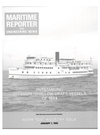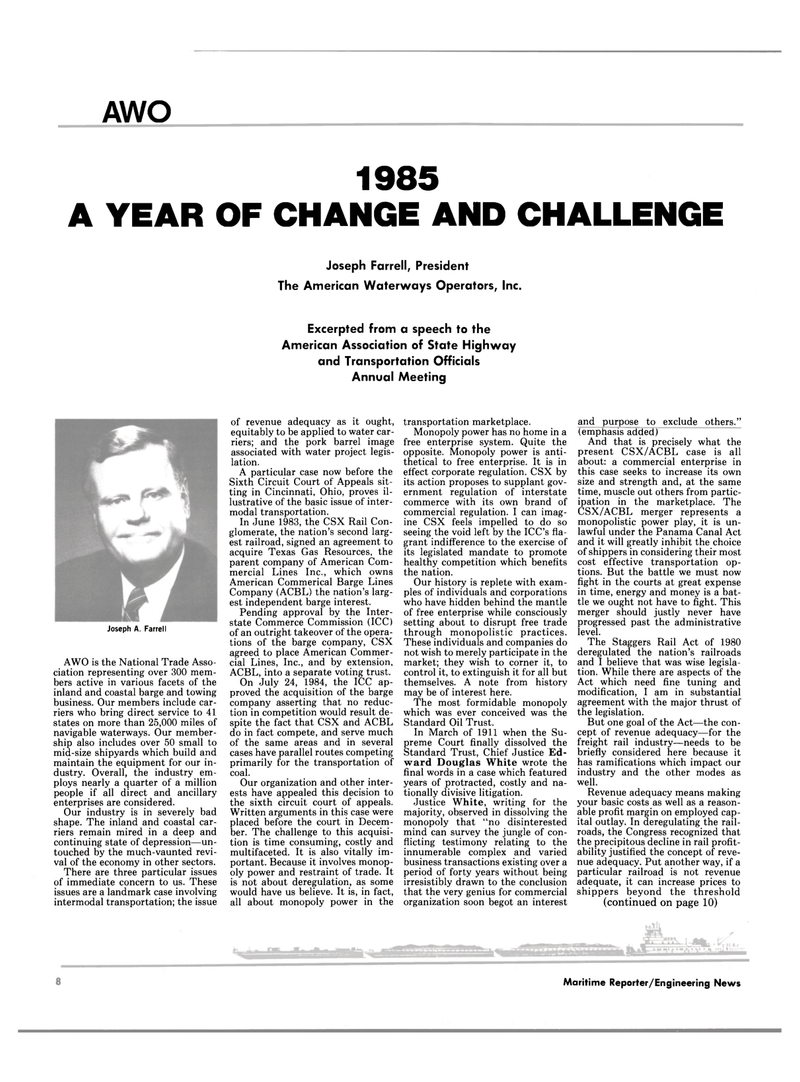
Page 6: of Maritime Reporter Magazine (January 1985)
Read this page in Pdf, Flash or Html5 edition of January 1985 Maritime Reporter Magazine
AWO 1985
A YEAR OF CHANGE AND CHALLENGE
Joseph Farrell, President
The American Waterways Operators, Inc.
Excerpted from a speech to the
American Association of State Highway and Transportation Officials
Annual Meeting
Joseph A. Farrell
AWO is the National Trade Asso- ciation representing over 300 mem- bers active in various facets of the inland and coastal barge and towing business. Our members include car- riers who bring direct service to 41 states on more than 25,000 miles of navigable waterways. Our member- ship also includes over 50 small to mid-size shipyards which build and maintain the equipment for our in- dustry. Overall, the industry em- ploys nearly a quarter of a million people if all direct and ancillary enterprises are considered.
Our industry is in severely bad shape. The inland and coastal car- riers remain mired in a deep and continuing state of depression—un- touched by the much-vaunted revi- val of the economy in other sectors.
There are three particular issues of immediate concern to us. These issues are a landmark case involving intermodal transportation; the issue of revenue adequacy as it ought, equitably to be applied to water car- riers; and the pork barrel image associated with water project legis- lation.
A particular case now before the
Sixth Circuit Court of Appeals sit- ting in Cincinnati, Ohio, proves il- lustrative of the basic issue of inter- modal transportation.
In June 1983, the CSX Rail Con- glomerate, the nation's second larg- est railroad, signed an agreement to acquire Texas Gas Resources, the parent company of American Com- mercial Lines Inc., which owns
American Commerical Barge Lines
Company (ACBL) the nation's larg- est independent barge interest.
Pending approval by the Inter- state Commerce Commission (ICC) of an outright takeover of the opera- tions of the barge company, CSX agreed to place American Commer- cial Lines, Inc., and by extension,
ACBL, into a separate voting trust.
On July 24, 1984, the ICC ap- proved the acquisition of the barge company asserting that no reduc- tion in competition would result de- spite the fact that CSX and ACBL do in fact compete, and serve much of the same areas and in several cases have parallel routes competing primarily for the transportation of coal.
Our organization and other inter- ests have appealed this decision to the sixth circuit court of appeals.
Written arguments in this case were placed before the court in Decem- ber. The challenge to this acquisi- tion is time consuming, costly and multifaceted. It is also vitally im- portant. Because it involves monop- oly power and restraint of trade. It is not about deregulation, as some would have us believe. It is, in fact, all about monopoly power in the transportation marketplace.
Monopoly power has no home in a free enterprise system. Quite the opposite. Monopoly power is anti- thetical to free enterprise. It is in effect corporate regulation. CSX by its action proposes to supplant gov- ernment regulation of interstate commerce with its own brand of commercial regulation. I can imag- ine CSX feels impelled to do so seeing the void left by the ICC's fla- grant indifference to the exercise of its legislated mandate to promote healthy competition which benefits the nation.
Our history is replete with exam- ples of individuals and corporations who have hidden behind the mantle of free enterprise while consciously setting about to disrupt free trade through monopolistic practices.
These individuals and companies do not wish to merely participate in the market; they wish to corner it, to control it, to extinguish it for all but themselves. A note from history may be of interest here.
The most formidable monopoly which was ever conceived was the
Standard Oil Trust.
In March of 1911 when the Su- preme Court finally dissolved the
Standard Trust, Chief Justice Ed- ward Douglas White wrote the final words in a case which featured years of protracted, costly and na- tionally divisive litigation.
Justice White, writing for the majority, observed in dissolving the monopoly that "no disinterested mind can survey the jungle of con- flicting testimony relating to the innumerable complex and varied business transactions existing over a period of forty years without being irresistibly drawn to the conclusion that the very genius for commercial organization soon begot an interest and purpose to exclude others." (emphasis added)
And that is precisely what the present CSX/ACBL case is all about: a commercial enterprise in this case seeks to increase its own size and strength and, at the same time, muscle out others from partic- ipation in the marketplace. The
CSX/ACBL merger represents a monopolistic power play, it is un- lawful under the Panama Canal Act and it will greatly inhibit the choice of shippers in considering their most cost effective transportation op- tions. But the battle we must now fight in the courts at great expense in time, energy and money is a bat- tle we ought not have to fight. This merger should justly never have progressed past the administrative level.
The Staggers Rail Act of 1980 deregulated the nation's railroads and I believe that was wise legisla- tion. While there are aspects of the
Act which need fine tuning and modification, I am in substantial agreement with the major thrust of the legislation.
But one goal of the Act—the con- cept of revenue adequacy—for the freight rail industry—needs to be briefly considered here because it has ramifications which impact our industry and the other modes as well.
Revenue adequacy means making your basic costs as well as a reason- able profit margin on employed cap- ital outlay. In deregulating the rail- roads, the Congress recognized that the precipitous decline in rail profit- ability justified the concept of reve- nue adequacy. Put another way, if a particular railroad is not revenue adequate, it can increase prices to shippers beyond the threshold (continued on page 10) 14
Maritime Reporter/Engineering News

 5
5

 7
7
